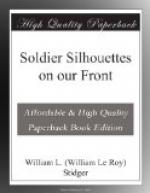Then we saw the signal boy go aft, and in a moment the tricolor of France was fluttering in the winds, and we knew that the approaching craft were friendly. Then through powerful glasses we could make them out to be long, low-lying, lithe, swift destroyers coming out to meet us. They were a welcome sight. Like “hounds of the sea” they came, long and lean. Headed straight for us, they came like the winds. Then suddenly a slight mist began to fall, but not enough to obscure either the destroyers or the sun. Through this mist the sun burned its way, and almost as if a miracle had been performed by some master artist, a beautiful rainbow arched the sky to the east, and under the arch of this rainbow fleetly sailed those approaching destroyers.
It was a beautiful sight, a Silhouette of the Sea never to be forgotten while memory lasts. The French flag fluttered, the band started to play the “Marseillaise,” and a ship-load of happy people sang it.
A sense of peace settled down over us all. The rainbow, covenant of old, promise of the eternal God to his people, seemed to have new significance that memorable day.
Another Silhouette of the Sea! Troops are expected in at a certain port of entry. The camp has been emptied of ten thousand men. That means but one thing, that new troops are expected. The great dirigibles sailed out a few hours ago. The sea-planes followed. Thousands of American men and women lined the docks waiting, peering with anxious eyes out toward the “point.” Here at this point a great cape jutted out into the ocean, and around this cape we were accustomed to catch sight of the convoys first.
A sense of great expectancy was upon us. We had heard rumors of submarines off the shore for several days. Then suddenly we heard a terrific cannonading, and we knew that the transports and the convoys were in a battle with the U-boats that had lain in wait for them. An anxious hour passed. The sun was setting and the west was a great rose blanket.
Then a shout went up far down the line of waiting Americans as the first great transport swung around the cape. Then another, and a third and a fourth, and finally a fifth; great gray bulks, two of them camouflaged until you could not tell whether they were little destroyers or a group of destroyers on one big ship. Then they got near enough to see the American boys, thousands of them, lining the railings. Through the glasses we could make out the names of the transports. They were some of the largest that sail the Atlantic. When as they came slowly in on the full tide, with that rose sunset back of them, the bands on their decks playing across the waters, and five thousand boys on the first boat singing “Keep the Home Fires Burning,” then the “Marseillaise,” and finally “The Star-Spangled Banner,” in which the crowd on the shore joined, there was a Silhouette of the Sea that burned its way into our souls.




